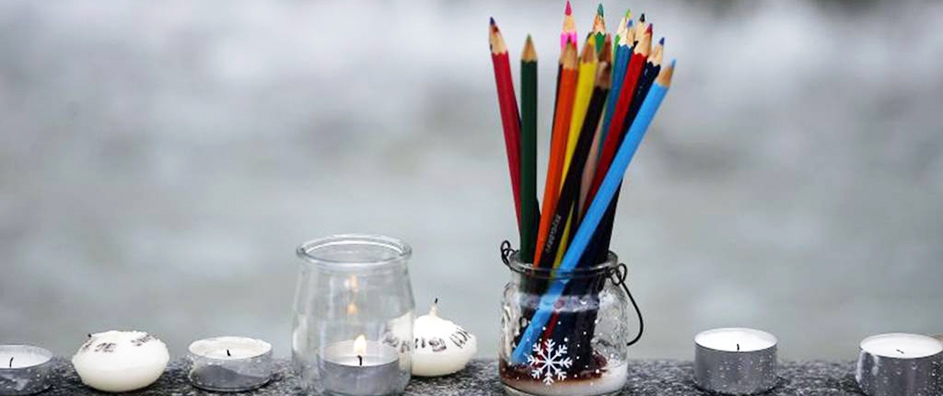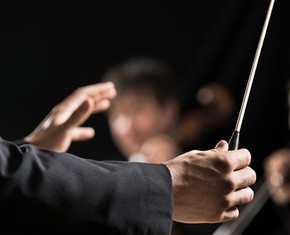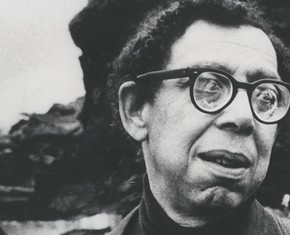The views expressed in our content reflect individual perspectives and do not represent the authoritative views of the Baha'i Faith.
As I compose this concluding essay in our series on torture, terrorists just brutally killed twelve people in Paris for offending them with cartoons. Even after writing that sentence, I have a hard time believing it.
French police have killed two of the perpetrators, but one of the participants in this heinous, premeditated and barbaric crime has turned himself in to police, and if he was involved in the mass murder, he will undoubtedly stand trial. If you’ve read through this series of essays, you know that Baha’is believe in peace, nonviolence and forgiveness—but what do the Baha’i teachings say about crime and punishment? Should we punish criminals? What should the punishment be for such a terrible attack on life and liberty? Several people I know who are currently investigating the Baha’i teachings have asked me those questions during the past day or two.
I’ll try to answer them here, with two particularly thought-provoking excerpts from the Baha’i writings, the first in the form of a fascinating recommendation from Abdu’l-Baha:
Years ago in Baghdad the usual punishment for offenders and lawbreakers was the bastinado. The governor noticed that a certain band of men came repeatedly before him for trial. They were regularly found guilty of breaking the law, sentenced and whipped upon the feet. While the bastinado was being inflicted they appeared quite comfortable and evidently unconscious of pain. In a few days these same offenders would be back again, going through the same process. The governor made careful inquiry about them. It was learned that they lived together in a house and that every day it was their custom to bastinado each other until the skin upon their feet had become so hardened to the whip that the legal bastinado gave them no inconvenience whatever.
Now we, as offenders against the opinions of our friends and enemies, must assist each other to become impervious to their criticism, unconscious of attack, welcoming their whips. You must beat me and I will beat you with the whips of love. The more we beat each other the more capable of withstanding we will become. When the enemies find they are increasing our love, enkindlement and service in the pathway of Baha’u’llah, they will wonder and say, “How is this? Our words have no effect upon them except to make them love us more and give thanks to God for our scourging.”
…Baha’u’llah won the hearts of his jailers and tormentors. No one could withstand Him. The intense flame of His love melted the hardest stone of hearts. The more chains of iron they put upon His body, the more He imprisoned them in chains of love. They looked upon Him in wonder; they became His followers. – Abdu’l-Baha, Star of the West, Volume 3, p. 105.
However—the Baha’i teachings point out, in many other places, that society must punish criminals—not for vengeance, but for its own protection, and the protection of the human rights of all. When Abdu’l-Baha was asked “Should a criminal be punished, or forgiven and his crime overlooked?” he answered this way:
There are two sorts of retributory punishments. One is vengeance, the other, chastisement. Man has not the right to take vengeance, but the community has the right to punish the criminal; and this punishment is intended to warn and to prevent so that no other person will dare to commit a like crime. This punishment is for the protection of man’s rights, but it is not vengeance; vengeance appeases the anger of the heart by opposing one evil to another. This is not allowable, for man has not the right to take vengeance. But if criminals were entirely forgiven, the order of the world would be upset. So punishment is one of the essential necessities for the safety of communities, but he who is oppressed by a transgressor has not the right to take vengeance. On the contrary, he should forgive and pardon, for this is worthy of the world of man.
The communities must punish the oppressor, the murderer, the malefactor, so as to warn and restrain others from committing like crimes. But the most essential thing is that the people must be educated in such a way that no crimes will be committed; for it is possible to educate the masses so effectively that they will avoid and shrink from perpetrating crimes, so that the crime itself will appear to them as the greatest chastisement, the utmost condemnation and torment. Therefore, no crimes which require punishment will be committed.
We must speak of things that are possible of performance in this world. There are many theories and high ideas on this subject, but they are not practicable; consequently, we must speak of things that are feasible. …the community has the right of defense and of self-protection; moreover, the community has no hatred nor animosity for the murderer: it imprisons or punishes him merely for the protection and security of others. It is not for the purpose of taking vengeance upon the murderer, but for the purpose of inflicting a punishment by which the community will be protected. If the community and the inheritors of the murdered one were to forgive and return good for evil, the cruel would be continually ill-treating others, and assassinations would continually occur…
Thus when Christ said: “Whosoever shall smite thee on the right cheek, turn to him the left one also,” it was for the purpose of teaching men not to take personal revenge. He did not mean that, if a wolf should fall upon a flock of sheep and wish to destroy it, the wolf should be encouraged to do so. No, if Christ had known that a wolf had entered the fold and was about to destroy the sheep, most certainly He would have prevented it.
As forgiveness is one of the attributes of the Merciful One, so also justice is one of the attributes of the Lord. The tent of existence is upheld upon the pillar of justice and not upon forgiveness. The continuance of mankind depends upon justice and not upon forgiveness. So if, at present, the law of pardon were practiced in all countries, in a short time the world would be disordered, and the foundations of human life would crumble. – Abdu’l-Baha, Some Answered Questions, p. 268
The Baha’i teachings, then, ask us to forgive individually–and only punish collectively. Baha’is recognize that the constitution of every community depends on justice. No community can allow the cruel oppression of injustice to continue—they must protect the rights of every human being. Cruelty, torture and murder have no place in a truly civilized and unified society. That primary goal—protecting the rights of every person—stands behind the Baha’i conviction that world unity and global governance will ultimately pave the path toward true justice.
















Comments
Sign in or create an account
Continue with Googleor